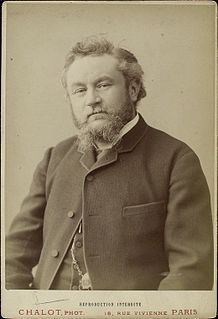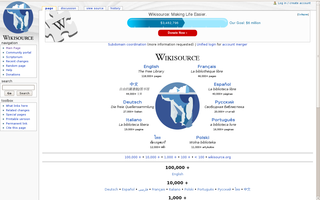
Le Chandelier is an 1835 play in three acts by French dramatist Alfred de Musset. [1]

19th-century French literature concerns the developments in French literature during a dynamic period in French history that saw the rise of Democracy and the fitful end of Monarchy and Empire. The period covered spans the following political regimes: Napoleon Bonaparte's Consulate (1799–1804) and Empire (1804–1814), the Restoration under Louis XVIII and Charles X (1814–1830), the July Monarchy under Louis Philippe d'Orléans (1830–1848), the Second Republic (1848–1852), the Second Empire under Napoleon III (1852–1871), and the first decades of the Third Republic (1871–1940).

Alfred Louis Charles de Musset-Pathay was a French dramatist, poet, and novelist. Along with his poetry, he is known for writing the autobiographical novel La Confession d'un enfant du siècle.
The play was first published in 1835 in Revue des deux Mondes . It was first staged at the Théâtre Historique in August 1848 with Mademoiselle Maillet as Jacqueline. [2] In October 1850, it was produced at the Comédie-Française with a cast including Delaunay as Fortunio and Allan as Jacqueline. In October 1850, the interior minister Léon Faucher had the work banned, a decision confirmed in subsequent seasons. [3]

The Revue des deux Mondes is a French language monthly literary, cultural and political affairs magazine that has been published in Paris since 1829.

The Théâtre Historique, a former Parisian theatre located on the boulevard du Temple, was built in 1846 for the French novelist and dramatist Alexandre Dumas. Plays adapted by Dumas from his historical novels were mostly performed, and, although the theatre survived the 1848 Revolution, it suffered increasing financial difficulty and closed at the end of 1850. In September 1851 the building was taken over by the Opéra National and renamed again in 1852 to Théâtre Lyrique. In 1863, during Haussmann's renovation of Paris, it was demolished to make way for the Place de la République. The name Théâtre Historique was revived by some other companies in the late 1870s and early 1890s.

The Comédie-Française or Théâtre-Français is one of the few state theatres in France. Founded in 1680, it is considered the oldest active theatre company in the world. Established as a French state-controlled entity in 1995, it is the only state theatre in France to have its own permanent troupe of actors. The company's primary venue is the Salle Richelieu, which is a part of the Palais-Royal complex and located at 2 rue de Richelieu on the Place André-Malraux in the 1st arrondissement of Paris.
Jacques Offenbach, who wrote incidental music for the Comédie-Française production, made a sequel entitled La chanson de Fortunio . An opera of 1907 by André Messager, Fortunio , was based closely on the play.

Jacques Offenbach was a German-French composer, cellist and impresario of the romantic period. He is remembered for his nearly 100 operettas of the 1850s–1870s and his uncompleted opera The Tales of Hoffmann. He was a powerful influence on later composers of the operetta genre, particularly Johann Strauss, Jr. and Arthur Sullivan. His best-known works were continually revived during the 20th century, and many of his operettas continue to be staged in the 21st. The Tales of Hoffmann remains part of the standard opera repertory.
Incidental music is music in a play, television program, radio program, video game, film, or some other presentation form that is not primarily musical. The term is less frequently applied to film music, with such music being referred to instead as the "film score" or "soundtrack".

La chanson de Fortunio is a short opéra-comique in one act by Jacques Offenbach with a French libretto by Ludovic Halévy and Hector Crémieux. The music was composed within a week, with a further week being spent in preparations for the production. Its success was welcome after the failure of Barkouf a fortnight earlier.








